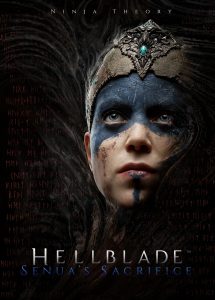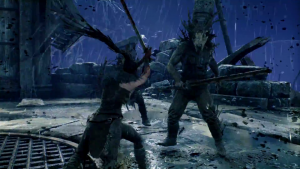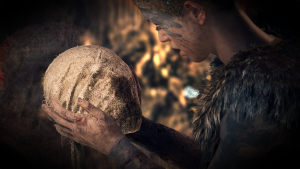Hellblade is reputable game developer Ninja Theory’s first attempt at creating an original IP, and for a first time effort, it’s a soaring success. In Hellblade: Senua’s Sacrifice, you play the role of titular Senua as she journeys her way to hell in search of a way to bring back her lost love Dillion, however the world seen through Senua’s eyes isn’t quite as it seems.
Hellblade: Senua’s Sacrifice is a 2017 psychological horror, action-adventure game it is developed and published by Ninja Theory, and is available on PC and Playstation 4.
Editor’s Note: This review contains major spoilers for Hellblade: Senua’s Sacrifice, continue at your own risk.
When you discuss a game like Hellblade there really isn’t much you can describe without going into spoilers. So much happens within it’s 6-8 hour lifespan, and the reason I say lifespan is because Hellblade is basically a game that will be played to experience the story once, and likely never picked up again. This isn’t a knock at the overall quality of the game, it’s actually a compliment as the game is a true cinematic quality experience.

Hell is only what we as human beings perceive it as, Senua’s hell is the loss of her love and the consistent bickering voices within her head.
THE GOOD: Based on Pict Norse mythology, Hellblade: Senua’s Sacrifice is about the titular character Senua facing what is essentially her inner demons, so much so that it takes her on a farce quest to revive her lover Dillion and “bring back his soul from Hel or Helheim”. However, losing her love has caused Senua to succumb to psychosis, the same illness her mother had, but it was viewed as the two “being able to see within the dark”. Senua’s father is a druid who convinced her clan that both Senua and her mother were full of this “darkness” that cursed them both. As you progress through the game you slowly unravel the truth of Senua’s quest, her past, and much more.

Voice actress Melina Juergens provides a powerful and emotionally convincing performance as titular lead Senua.
The world building is mostly provided through lore stones which are found throughout the world detailing the background information of Senua, her clan, and other tribes within her reality. While you can’t necessarily put yourself in Senua’s mindset one-hundred percent, one cant help but imagine that at least a few people suffering from psychosis would shed a few tears playing out her journey, some might even have a tough time getting through it’s entirety because it feels all too real. I’ve even seen some players without psychosis comment on how emotionally tough Hellblade is to finish.
Attributing to the theme of mental illness there are puzzles which features players finding Pict shapes to fill in by searching the area, often times combing two or more shapes to form the Pict required to move forward. Combat is pretty much the standard Ninja Theory affair, and you’ll pick up on it rather quickly if you’ve played many of their titles in the past. Another thing I’d like to point out is that the game absolutely refuses to hold your hand, in fact they only tell you what a single button prompt does from start to finish, and if you don’t hit the pause button, you’ll basically be figuring it out on your own as you go. Then there’s the controversial permadeath mechanic. If Senua dies enough times then the player save file will be deleted forcing players to start Senua’s journey over from the beginning. Black moss on Senua’s right arm will continue to grow until it reaches her head, at that point the permadeath will instantly activate.
The original soundtrack and score ranged from emotional lyrics to voiceless music that felt like it came straight from the mouths of Norse tribesmen. Voice actress Melina Juergens sold her performance as Senua so well that regardless of your own personal experience with psychosis or a lack thereof you’ll find a way to bond with this lead’s tortured soul.
THE BAD: Combat while ok is nothing really too spectacular. As I stated earlier, if you’ve played enough Ninja Theory games in the past then you’ll find yourself right at home, so there really shouldn’t be much worry of death until the latter areas of the game when the challenge of the enemies increases.
OVERALL THOUGHTS: Hellblade: Senua’s Sacrifice is a fantastic mind bending journey into the psyche of the mentally ill. Senua losing her grasp on reality within a Norse world is captured in a way that’s emotionally flawless, and Senua herself is an attachable lead thanks in part to her voice actress Melina Juergens. Hellblade will be the foundation of a hopefully permanent run of self-published games by Ninja Theory.




















You must be logged in to post a comment.